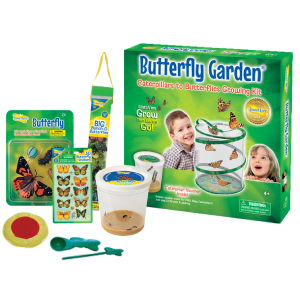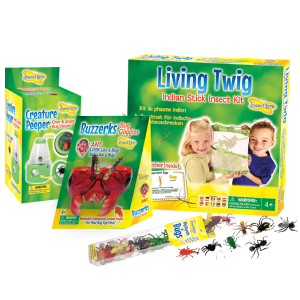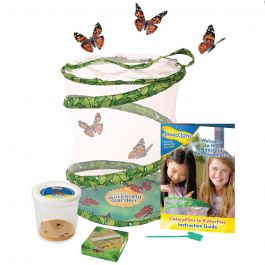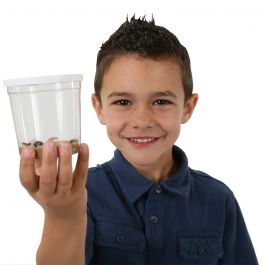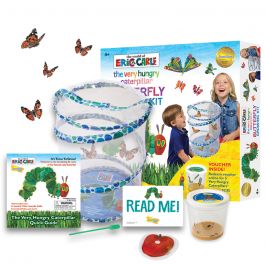
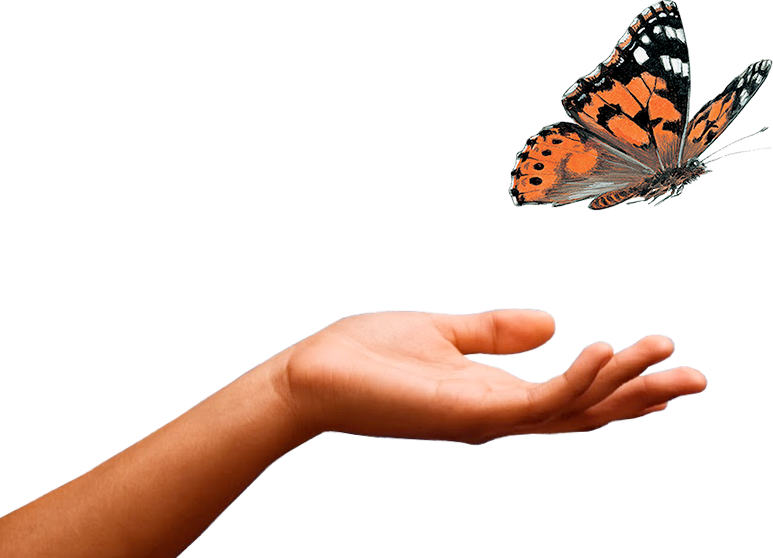
-
Butterfly Fact # 21
Painted Lady butterflies can cover a lot of ground - up to 100 miles per day during their migration.
-
Butterfly Fact # 32
A Painted Lady butterfly is capable of reaching speeds of nearly 30 miles per hour.
-
Butterfly Fact # 100
Butterflies taste with their feet!
-
Butterfly Fact # 5
The Painted Lady butterfly is the most widely distributed butterfly in the world.
-
Butterfly Fact # 4
Painted Lady butterflies feed from over 100 different plants; this makes them incredibly vital pollinators.
-
Butterfly Fact # 24
Caterpillars have twelve tiny eyes located near the mouth on both sides of the head.
-
Butterfly Fact # 47
Butterflies will often feed from mud puddles to ingest minerals and salts, which are important supplements to their diet.
-
Butterfly Fact # 42
Caterpillars have false legs at the rear of their bodies, which can be used for grasping or as "suction" cups.
-
Butterfly Fact # 71
Butterfly wings are formed by layers of "chitin", the protein that makes up an insect's exoskeleton.
-
Butterfly Fact # 11
When a butterfly emerges from the chrysalis, its mouth is made up of two separate pieces. The butterfly must "fuse" or "zip" these two parts together to form one tubular proboscis before it is able to eat.
-
Butterfly Fact # 99
Caterpillars spin silk using tiny spinnerets located on the lower part of the head. When you see a caterpillar moving its head from side to side, it is usually spinning silk.
-
Butterfly Fact # 19
Caterpillars spin silk using tiny spinnerets located on the lower part of the head. When you see a caterpillar moving its head from side to side, it is usually spinning silk.
-
Butterfly Fact # 14
Most butterflies prefer to feed on nectar, but others will feed on the juices of rotting fruit or animal dung.
-
Butterfly Fact # 20
If butterflies get too cold, they cannot fly, feed or mate. That's why we recommend you release your butterflies when daytime temperatures are above 55 degrees Fahrenheit.
-
Butterfly Fact # 41
Painted Lady butterflies can adjust to almost any habitat. They are found in suburban, agricultural, swamp, bog, marsh, tundra, desert, meadow, forest, rainforest and mountain environments.
-
Butterfly Fact # 52
All butterflies have a long, tube-shaped mouth called a "proboscis" which they use to drink liquids such as plant nectar. When not in use, this proboscis stays curled up and out of sight.
-
Butterfly Fact # 64
The vibrant colors of a butterfly's wings warn predators to stay away. These bright colors signify that the butterfly may taste bitter or may even be poisonous.
-
Butterfly Fact # 3
Butterflies have no lungs. They breathe through openings on their abdomen called 'spiracles'.
-
Butterfly Fact # 29
Butterflies use their antennae to feel, smell and hear.
-
Butterfly Fact # 53
A butterfly's proboscis is almost as long as its entire body.
-
Butterfly Fact # 7
A group of butterflies is known as a "flutter", "swarm", "rabble" or "kaleidoscope" of butterflies.
-
Butterfly Fact # 13
A caterpillar's first meal is often its own eggshell. The outer shell of the egg is rich in protein and gives them a nutritious boost.
-
Butterfly Fact # 10
Butterflies are nearsighted but can see many of the same colors that we can - as well as ultraviolet colors that we are unable to see.
-
Butterfly Fact # 8
Once released, Painted Lady butterflies can live outdoors for as long as an entire year.
-
Butterfly Fact # 27
Painted Lady caterpillars will shed their exoskeleton five times as they eat and grow.
-
Butterfly Fact # 73
The largest threat to butterflies is the loss of their habitats. The increase in farming, forestry, land and building development and climate change result in the decline of butterflies and moths.
-
Butterfly Fact # 62
Butterflies produce a special adhesive to "glue" their eggs to host plants.
-
Butterfly Fact # 34
Painted Lady butterflies inhabit every continent except Australia and Antarctica.
-
Butterfly Fact # 85
A butterfly cannot fly or eat immediately after emergence. It needs time to prepare itself for life as a butterfly.
-
Butterfly Fact # 1
Painted Lady butterflies lay their eggs on thistle, malva (or mallow), hollyhock and fiddleneck.
-
Butterfly Fact # 22
Painted Lady caterpillars spin silk. They use this silk to attach themselves to their host plants. You'll see your caterpillars spinning silk when your Cup of Caterpillars arrives.
-
Butterfly Fact # 101
One caterpillar has as many as 4,000 muscles in its body - with 248 in its head alone.

